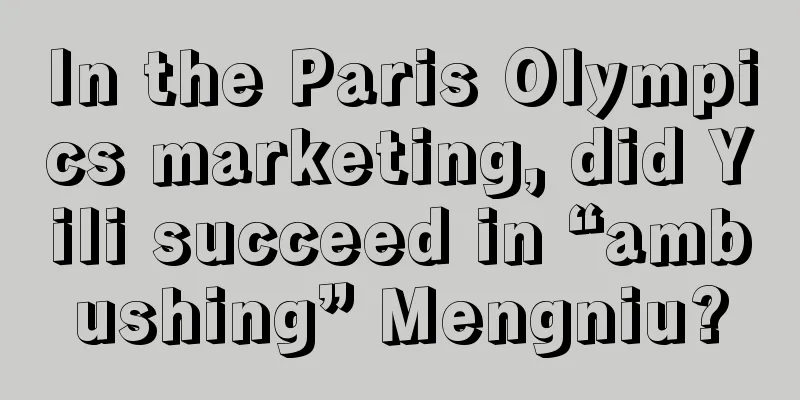In the Paris Olympics marketing, did Yili succeed in “ambushing” Mengniu?

On the Olympic stage, a stage that commands worldwide attention, the marketing war has never stopped. It is not only a competition of sports but also a competition of wisdom and creativity among the world's top brands. Historically, the red and blue duel between Pepsi and Coca-Cola, and the sports equipment competition between Adidas and Nike, are both legendary duels in the marketing world. Their stories are rewritten in every Olympic Games, becoming an indelible chapter in brand history. What impressed people more in China during this year's Paris Olympics was the marketing competition between dairy giants Mengniu and Yili, which launched a unique brand competition on this battlefield. As a global partner of the Paris Olympics, Mengniu enjoys unparalleled exposure advantages. Yili, as the official dairy partner of the Chinese sports delegation, was also not to be outdone and demonstrated the strength and determination of its brand by sponsoring a number of top athletes. I asked several people in the industry which marketing campaign for this year's Paris Olympics left the deepest impression on them. The most common answers were the collaboration between Yili and Chen Luyu, the collaboration between Yili and the actor who played Sha Monk, and Yili's poster blunder. The first two are positive marketing, and the latter is negative news. But overall, Yili's marketing volume in this Olympics is huge. So has Yili’s marketing momentum surpassed Mengniu’s? 01 Paris Olympics, marketing moves by Mengniu and YiliDuring the 2024 Paris Olympics, Mengniu and Yili adopted different marketing strategies. Mengniu debuted as an Olympic Global TOP Partner for the first time. As a global TOP partner of the Paris Olympic Games, Mengniu enjoys many privileges, including the use of Olympic intellectual property rights worldwide, priority advertising rights, and participation in the Olympic torch relay. Among the 15 top sponsors of the Paris Olympics, Mengniu and Alibaba are the only two Chinese companies. In order to maximize the use of this top sponsorship, Mengniu has carried out a series of marketing actions: Mengniu invited many of its well-known spokespersons, including actors Tang Wei, Gu Ailing, Zhao Lusi, Jin Dong, Yang Zi and Wang Yibo, to participate in the Olympic torch relay, and carried out large-scale publicity through social networks before the start of the Olympics to increase brand exposure and influence. In addition, Mengniu collaborated with internationally renowned director Zhang Yimou to shoot a promotional video, which, with its unique perspective and emotional expression, showcased the Olympic spirit and sentiments, and conveyed the core value of the Mengniu brand: “Being Strong”. Due to the exclusivity of being an Olympic TOP sponsor, Yili cannot directly participate in official Olympic-related marketing activities. Therefore, Yili conducts marketing through other creative means. Yili is the official dairy partner of the Chinese sports delegation at the 2024 Olympic Games. In terms of marketing cases, the most impressive ones are the cooperation between Yili and Chen Luyu, and the joint marketing between Yili and Liu Dagang, who plays the role of Monk Sha. In its collaboration with Chen Luyu, Yili took advantage of the internet meme that the Paris Olympic Games emblem is similar to Chen Luyu's image. Yili announced Chen Luyu as the "Paris Games Ambassador" and filmed a humorous commercial. In the commercial, Chen Luyu personally played jokes and interacted with the audience, successfully linking her image with the Paris Olympics. This cooperation not only increased Yili's brand awareness, but also increased the brand's fun. After that, Yili discovered that the color scheme of the Paris Olympic venues was similar to the color scheme of Monk Sha's clothing in "Journey to the West", so it invited Liu Dagang, who played Monk Sha, to be the "Yili Paris Fashion Ambassador" and named him "Fashionable Basha Men". Yili produced a humorous short film based on this Chinese-style meme. In the short film, Liu Dagang combined it with modern Internet memes, such as "The sand that misses you still blows to Paris" and "Dream purple, Paris purple, it looks like the absolute purple on me", and this creative content attracted a lot of attention. In addition, Yili also sponsors athletes such as Quan Hongchan, Zheng Qinwen, Sun Yingsha, and Wang Chuqin. After they achieve good results, Yili updates relevant posters as soon as possible to attract attention. It can be seen that as a TOP sponsor, Mengniu's marketing is more formal and direct. Whether it is the torch relay or the promotional video in cooperation with Zhang Yimou, they are closely linked to Mengniu's theme of "being strong". Yili, on the other hand, uses indirect marketing tactics to cleverly hint at its relationship with the Olympics without mentioning any Olympic-related elements, thereby attracting public attention. 02 Did Yili’s “ambush” of Mengniu succeed?As mentioned earlier, because the official partners of the Olympics are exclusive, only a few brands can use the Olympics for marketing in a legitimate way. However, as a traffic and topic center, no brand wants to miss such a marketing opportunity, so they will find ways to market through marginal means. Take the fierce competition between Adidas and Nike during the 2012 London Olympics. Adidas had the official Olympic partner status, but Nike's "ambush" caused a sensation in the industry. Nike bypassed advertising restrictions at the London Olympics and recruited 400 athletes as ambassadors to wear their shoes and shoot short films in creative locations such as "Little London" in London, Ohio and Jamaica, which attracted huge attention. In China, whenever an athlete achieves outstanding results, Nike releases a poster with the theme of "Live Your Greatness". The poster does not have any Olympic elements, but people will definitely think it is an Olympic poster at first glance. That year, 37% of people thought Nike was an Olympic sponsor, while 24% knew of official sponsor Adidas. Nike gained 57,000 followers on social media, while Adidas only had 12,000. Nike has proven that even if it is not an Olympic sponsor, it can still make Olympic marketing deeply rooted in people's hearts. In this Paris Olympics, Yili's ambush strategy also worked well. If you look closely at two of Yili's more popular videos, you will find that its intention to skirt the rules is very obvious. During the collaboration with Chen Luyu, a foreigner asked Chen Luyu: "Have you sponsored your face to the Paris event?" Chen Luyu said: "It is sponsored by Yili." Then the foreigner repeated, "Paris logo, sponsored by Yili." The Paris Olympics does not appear here, but what is implied is that Yili sponsors the Olympics. During the collaboration with Liu Dagang, a foreigner asked, “Did you sponsor the Paris event with your aesthetics?” Junior Brother Sha said, “No.” The foreigner answered himself: "It's Yili's sponsorship again." It can be seen that the words "Yili", "sponsorship" and "Paris" appear many times in the two films. The general public doesn’t really care who the sponsors of the Olympics are, but they also know that those sponsoring the Olympics must be top brands. Through two viral videos, Yili misled consumers into believing that it was an Olympic sponsor. I believe Mengniu must be feeling very uncomfortable. In addition, just like Nike used images of athletes for Olympic-related marketing, Yili also used this strategy, quickly releasing posters as soon as the athletes won the championship and won praise, but Yili went a bit too far in this regard. Before the women's singles table tennis final ended, Sun Yingsha's championship poster was released, and before the women's singles tennis final started, Zheng Qinwen's championship poster also appeared outdoors. Yili eventually had to apologize for this. Yili’s “ambush” marketing could be said to be perfect if it weren’t for the poster blunder. But overall, I think Yili’s overall marketing has gained more than it has lost. 03 How can brands conduct ambush marketing without sponsoring the Olympics?Although becoming an official sponsor of the Olympics can provide huge exposure opportunities, the high sponsorship fees also make many brands reluctant to participate. However, not sponsoring the Olympics does not mean that brands cannot use the popularity of the Olympics for marketing. Here are some effective ambush marketing strategies: 1. Make full use of social networksThe rise of social media has provided brands with unprecedented marketing opportunities. Compared with traditional media, social media has stronger real-time, interactive and communication capabilities. During the Olympic Games, a large number of hot topics related to the Olympics will be generated on social media. Brands can capture these hot topics in a timely manner and combine their own products or services to create topical content, which will quickly attract the attention and discussion of netizens. Brands can also initiate topic challenges, hold online events, etc. to encourage users to participate in interactions, generate a large amount of UGC, and expand brand influence. 2. Leverage on popular athletesWhile official Olympic sponsors enjoy the advantage of exclusivity, brands can still engage in effective ambush marketing by sponsoring athletes. Athletes are at the core of the Olympics, and their performances and stories often spark widespread attention and discussion. Brands can choose well-known athletes as spokespeople and promote their brands through their performances and influence during the Olympics. For example, during this Paris Olympics, Yili sponsored tennis player Zheng Qinwen and carried out a series of related marketing activities during her competition to increase the brand's exposure. In 2012, after Liu Xiang, the Nike spokesperson, withdrew from the competition, Nike immediately released the Liu Xiang-related poster mentioned above, which became a hot topic on the Internet. By sponsoring athletes, brands can also produce a series of creative content, such as behind-the-scenes footage, training videos, post-match interviews, etc., and disseminate them on social media. This strategy can not only increase brand awareness through the traffic of athletes, but also trigger emotional resonance through real stories. 3. Keep up with the latest trendsDuring the Olympic Games, various hot topics emerge one after another, from the opening ceremony to various competitions to the wonderful moments of athletes, which are all great opportunities for brands to conduct ambush marketing. Brands need to have the ability to respond and execute quickly, and quickly launch relevant marketing content when hot topics emerge to promote their brands. The key to keeping up with hot topics lies in speed and creativity. Brands need to have a flexible team and efficient execution mechanism to ensure that they can respond to hot topics as soon as they appear. In addition, creative content needs to be closely integrated with the brand image and Olympic spirit in order to stand out from the crowd of information and gain the attention and love of consumers. In the 2012 London Olympics, Liu Xiang withdrew from the competition due to injury. Durex quickly posted a Weibo post, which became a hot topic on the entire Internet and became one of the hottest topics of the day. 4. Spread the spirit of sportsThe sports spirit conveyed by the Olympics is universal, and any brand can combine this spirit with its own brand values. A clever way is to combine Olympic elements such as green fields, sports equipment, and sports gear with the brand spirit without involving infringement, so that consumers believe that they are connected to the Olympics. Nike's "Live Your Greatness" series of advertisements during the 2012 London Olympics is a typical example. Nike did not directly use the Olympic logo, but instead linked the brand with the Olympics by emphasizing the spirit of sports. This marketing approach not only avoided the risk of infringement, but also successfully conveyed the brand's values. The number of sponsors for the Olympics is limited. Even for top brands, the exclusivity of the sponsorship policy prevents competing top brands from directly using the Olympics for marketing. However, there are many indirect marketing methods. Using social networks to market and ambush competitors has become an effective and cost-effective strategy. It is foreseeable that such ambush marketing will become more and more common in future large-scale events. |
<<: Saying goodbye to the free era, is Xianyu anxious to make money?
>>: Taobao's balancing strategy is to encourage people to "compete with their internal strength"
Recommend
Xiaohongshu: Why is it so difficult to “plant grass” overseas?
This article deeply analyzes the difficult process...
Why can’t small businesses do short video marketing well?
This article shares the author's experience in...
Does TradeKey cost money? What are the platform services?
Today's trade is developing very rapidly. Many...
How long is the settlement cycle for ordinary Amazon sellers? What are the rates for each payment method?
No matter which payment method Amazon sellers use,...
Talk about the business closed loop in user research
Many user researchers are using magnifying glasses...
Is it easy to run a cross-border e-commerce platform in Africa? What is it suitable for?
Cross-border e-commerce is developing very rapidly...
Can I add inventory to Amazon's flash sales? How do I replenish inventory on Amazon's flash sales?
For Amazon merchants, there are many activities th...
7 core questions about Xiaohongshu’s community, growth, and people-oriented approach
This article takes the growth of Xiaohongshu as th...
What is the best cross-border e-commerce product to sell in Poland? What are the European e-commerce platforms?
Poland, as the largest Central and Eastern Europea...
How to optimize Amazon's automatic advertising if it doesn't work well? What is the automatic advertising optimization plan?
Amazon automatic advertising is an important means...
How to upload products to Amazon store? What are the uploading steps?
After opening an Amazon store, merchants need to u...
The number of fans increased by 6.5 million in three months, and the "grandma version" of Li Ziqi became popular, and a meal made netizens cry
The rural track still has huge traffic, and how to...
How can I check if Lazada has been restricted in terms of orders? What is the reason for the restriction?
Lazada is a popular cross-border e-commerce platfo...
38 big promotion, undercurrent
After International Women’s Day, the first major p...
2023, not only private domain, but also growth!
Different user groups have different strategies fo...









